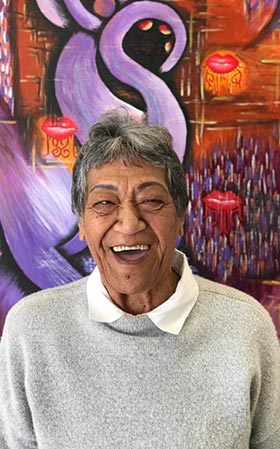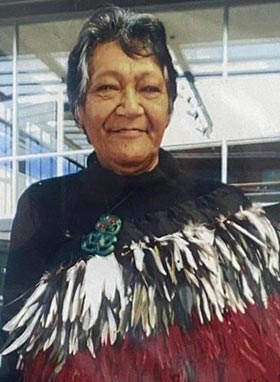
Kui Jamesina Kett was born and raised on D’urville Island in late 1935. She is of Ngāti Koata, Ngāti Toa Rangatira, Ngāti Kahungunu and Rongomaiwahine descent.
Kui and her whānau moved to Porirua, where she found her passion and followed in the footsteps of her older sisters Olive, Te Rangikauia and Huia who were nurses. She completed her psychiatric nursing training between Porirua, Ngawhatu and Tokanui Hospitals.
In the 1970s, she was the charge nurse of the psychopaedic ward at Tokanui Hospital. While she was there, she was involved in Te Roopu Awhina o Tokanui who were instrumental in the development of Whaiora. Kui was one of the founding members of Te Kaunihera o ngā Nēhi Māori who were motivated by a challenge to nēhi Māori to do more from Minister Matiu Rata at the Hui Taumata, Auckland in 1984. During deinstitutionalisation of Tokanui Hospital, Kui helped transition people into the community. She also supported the development of Hauora Waikato – an inspirational “one-stop shop” health service for Māori. In 2012, Kui Jamesina received the Whetū Kanapa Award from Te Ao Māramatanga for her extensive contribution to Māori mental health nursing. When hospital-based nursing training transitioned into polytechnics, Kui became involved in the Tihei Mauri Ora Māori nursing programme at Waikato Polytechnic. She then became a founding member of Whārangi Ruamano Māori Nurses National Educators Group. Kui continued to contribute to Māori nursing for the remainder of her journey as the Kui for our Whitireia Bachelor of Nursing Māori programme in Wellington. Kui held the mana of Kaitiaki Rangatira. Her knowledge diversified with her experiences as a nēhi Māori, educator, nurse leader and Kui. The knowledge and experience she developed over the years provided the understanding and desire to improve the state of nursing for iwi Māori hapu and whanau. This led to the commitment of embracing her role as Kui at Whitireia.

A prerequisite to the Whitireia Bachelor of Nursing Māori (BNM) is that all tauira must whakapapa Māori. Kui emphasised the saying that “every Māori whānau deserves a nēhi Māori”. That is, not just a nurse who can whakapapa Māori, but a nurse who gains knowledge and can work from a Māori wellness framework. Thus, enabling whānau to grow their potential and provide quality care and respect for all. Many tauira were well versed in their whakapapa, and many were not. Kui helped transition those who lacked connection by encouraging them to develop self-awareness and personal development through wānanga. This is where many of us identified we come from the same communities we are trying to serve. Kui helped transform us from untapped potential to leaders. Her wisdom came from a place of whānau, hapū and iwi. She helped us nurture and care for each other through her own kindness and care for us. It can be rough in the world of nursing. There is a saying, “nurses eat their young”. Kui provided us with the knowledge and strength through a Māori lens to overcome such difficulties. From a Māori perspective, we have a tuakana-teina model. Our old don’t eat their young, we nurture and grow them so they may blossom into tomorrow’s leaders – poipoia te kākano, kia puawai. As a duo, Kui and Shayola [Koperu] nurtured us through the notion of kawa whakaruruhau under the tuakana-teina and whakamana processes that strengthen and empower relationships of trust and integrity.
BNM Mantra nā Jamesina Kett
Nurses are never late, they are cool, calm, collective and supportive.
Whakarongo: Attentive – I listen. I hear what is being said.
Titiro: Observant – I look and see.
Kōrero mai: Articulate – I talk confidently.
He puku tēnei: Intuitive – I acknowledge my puku power.
Ngāmahi: Competent – I work effectively.
E tū: Grounded – I stand tall.
Hīkoi: Authentic – I walk tall.
Nurses are cool, calm and collective.
Nurses are cool because nurses have the knowledge.
Nurses are calm because nurses have the skills.
Nurses are collective because nurses can work as a team to benefit… he tangata, he tangata, he tangata!
Mauriora.
Kawa whakaruruhau emerged from the experiences of Māori nursing students and Maori nurse educators at Hui Waimanawa in Christchurch, 1988. Kui taught us knowledge of how kawa whakaruruhau truly works. Kawa Whakaruruhau is more than cultural awareness, cultural safety, cultural sensitivity, and cultural respect. It is about guiding, developing and caring for people: not from an illness framework but from a wellness framework by implementing kaitiakitanga, rangatiratanga, manaakitanga, pūkengatanga and whanaungatanga. It is about supporting and growing tauira, remembering your whānau, hapū, iwi.
Under Kui’s guidance, 10 cohorts graduated from Whitireia BNM. Kui’s vision was to have nēhi Māori throughout health and education. She encouraged graduates to gain skills and knowledge, to have courage, to further untap our potential as leaders. We have graduates in Aotearoa, Australia, Bermuda, Europe and the Pacific Islands working as nēhi Māori, Whānau Ora practitioners, nurse managers, NETP educators, researchers, health policy analysts, PDRP coordinators and many returning to Whitireia as kaiako to give back. For Māori to succeed, we need to determine our own direction – tino rangatiratanga. It’s not just about having many graduates but having quality nēhi Māori helping people become change makers. Kui always spoke about courage and being agents of change – education being key. Kui developed and gifted a mantra to Whitireia BNM that enhances nursing senses and observation, and instils the confidence and bravery to be rangatira and kaitiaki o ināianei. This is the korowai and legacy that Kui has blanketed over our programme and nēhi Māori.



